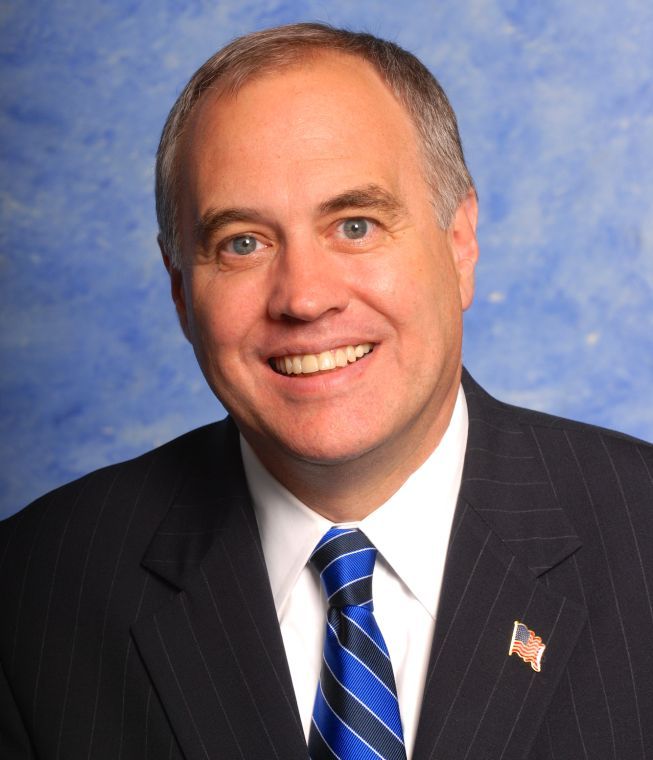State Comptroller Thomas DiNapoli said on Tuesday that he is taking nothing for granted in his campaign for re-election this November, but for the moment his top priority is performing the duties of his office, .
“I’m trying to focus on governmental stuff for as long as I can,” DiNapoli said in an interview with Blank Slate Media.
DiNapoli, a resident of Great Neck Plaza who grew up in Albertson, is being challenged by Republican Robert Antonacci, the Onondaga County Comptroller.
DiNapoli said he intends to run on his success in handling the state pension fund in a way that has placed New York among the top states in the country as well as his close supervision of government finances around the state and his office’s openness to the public.
“We’re conducting investigations. We’re using the office in creative ways to let people know what’s going on,” he said. “Why change course midstream.”
DiNapoli was appointed as the state comptroller in 2007 by the state Legislature after Alan Hevesi resigned from the post, following a corruption scandal in which he was found to have used state employees to take care of his ailing wife.
In 2010, DiNapoli narrowly won re-election against Republican challenger Harry Wilson, a former investor who worked in the treasury department for the Obama administration. Before being appointed state comptroller he served as a state assemblyman and was a trustee for the Mineola Board of Education, which he was first elected to at the age of 18.
He said one of the few things worrying him about the upcoming election was the potential for low voter turnout – particularly in New York City where Democrats running for statewide office typically rely on strong support.
“It’s just a hunch on my part,” he said about his suspicion of low voter turnout. “I think the challenge is to get people to see that this is an important office.”
DiNapoli said his office plans on highlighting the importance of his office to the operation of state government, in an effort to bring out more voters.
“We’re the independent voice,” he said of the comptroller’s office.
DiNapoli defended his recent decision to not seek public financing under legislation recently approved by the state Legislature that applies to the state comptroller’s race but no other state office holder.
He said he was a strong advocate for public financing, but the legislation was approved “too late in the game” and would require him to return a large portion of the money he has already raised for the race. At the same, he said, his use of public finance would remove the pressure from other state officeholders to agree to public financing for themselves.
The public financing system would match every dollar raised by a candidate with six dollars of public money, with the objective of eliminating political donations from large corporations.
DiNapoli said he believes the board of elections should have required other offices to use public financing and also said he was “left out of the discussions.”
“I don’t think it should be done in isolation,” he said.
His opponent has said he will use public financing to fund his campaign.
DiNapoli, in his interview with Blank Slate Media, also called for the implementation of a mandate relief task force, which would repeal unfunded state mandates on local municipalities.
He said the 2 percent property tax cap, signed into law by Gov. Andrew Cuomo in 2011, was supposed to be coupled with the repeal of unfunded state mandates. But, DiNapoli said, that promise has not yet been delivered by the state.
“There has not been significant mandate relief,” he said.
Despite the unfunded mandates, he said, “there’s been great compliance” with the cap from the local municipalities.
DiNapoli said he now supports a plan by Cuomo that would allow municipalities to defer pension payments to the state after the governor reduced the time in which the money can be deferred.
He said municipalities can pay a “portion of the [pension] increase” and pay off the remainder of the cost throughout the next 12 years.
DiNapoli said the state’s requirement to limit the deferral of pension payments has put New York on a better footing than most other states.
He also said he believes that the consolidation of services – if not governments – is a way that municipalities, special districts and school districts throughout Long Island can save money for taxpayers.
“In some cases, consolidation can save money,” he said.
He said the consolidation of the Village of Great Neck’s sewer system with the Great Neck Water Pollution Control District was a “great example” of how consolidation can save taxpayers money.
DiNapoli said he did not believe the consolidation of governments was politically possible, but said the consolidation of services could serve the same purpose.
He said the sharing of school superintendents and assistant superintendents in eastern Long Island could be a model for other schools and local governments around the state.
“To me, you don’t need 56 superintendents,” he said. “That should be something to look at in Nassau.”
Consolidating services, rather than the districts, he said, would allow for taxpayers to save money without “getting involved in the local issues and entanglements.”



